Sign up for The Wild
We’ll help you find the best places to hike, bike and run, as well as the perfect silent spots for meditation and yoga.
You may occasionally receive promotional content from the Los Angeles Times.
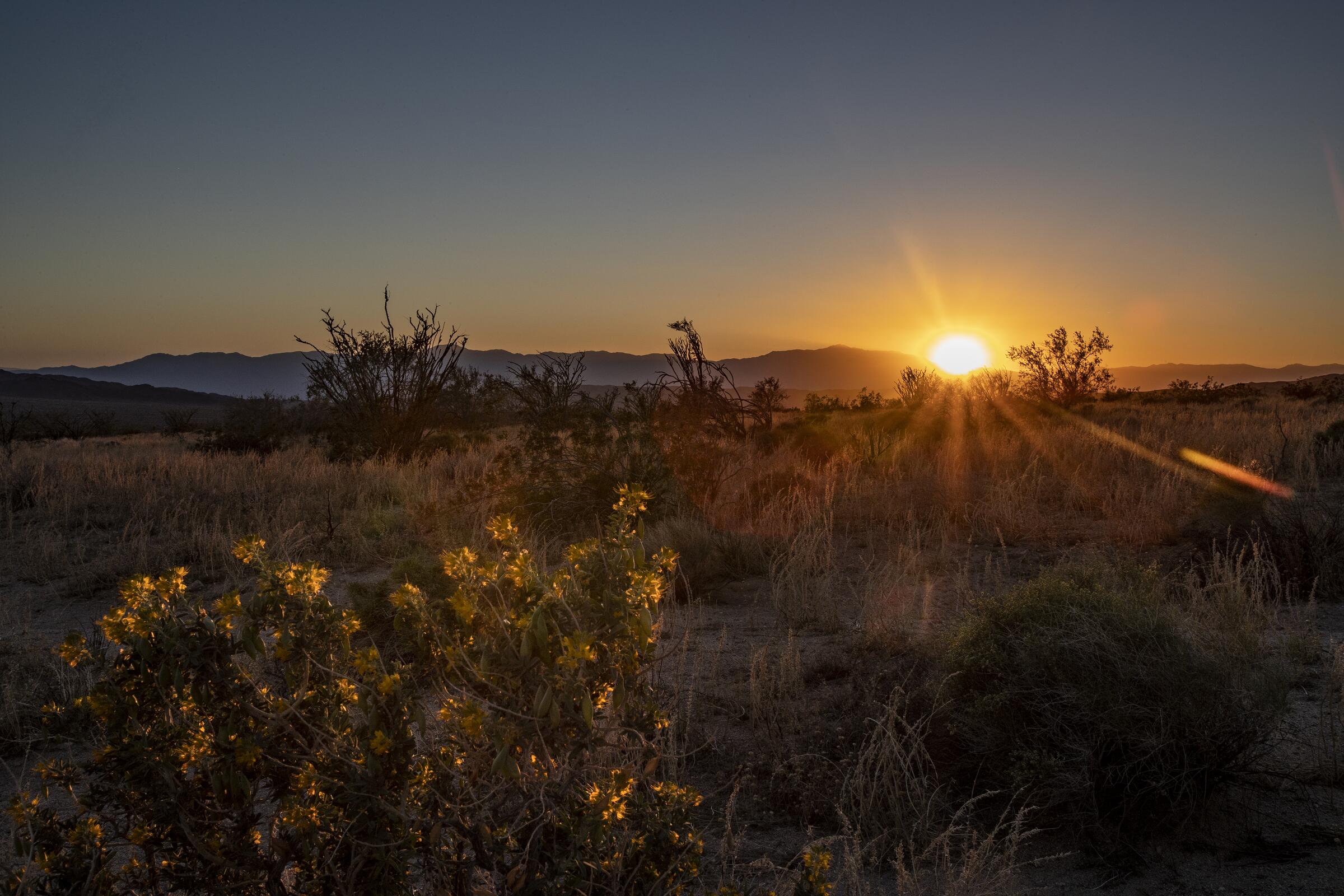
Well before Valentine’s Day 2019 sent a gushing love letter — nearly 4 inches of rain — to Southern California, my wife, Mica, and I were planning our first foray into spring desert wildflowers.
The Palm Springs area was our target. The rains trigger an explosion of desert wildflowers so intense it was known as the superbloom.
Early rainfall this season suggested a second flower dazzler, but a mostly dry January and February have since tempered expectations. Botanist and wildflower enthusiast Tom Chester characterizes 2020 as a typical “good” spring, with plants already in bloom at lower elevations and hitting 3,000 feet about mid-March.
Wildflower season is merely the frosting on the cake. So, yes, by all means try to catch glimpses of nature’s floral miracles. But at the end of the day, don’t forget that Palm Springs and the area are rich in finds as well, some natural, some man-made. For four days last winter, we wandered and wondered, sometimes on our own, sometimes under a guide’s tutelage. Here’s a sampler platter.
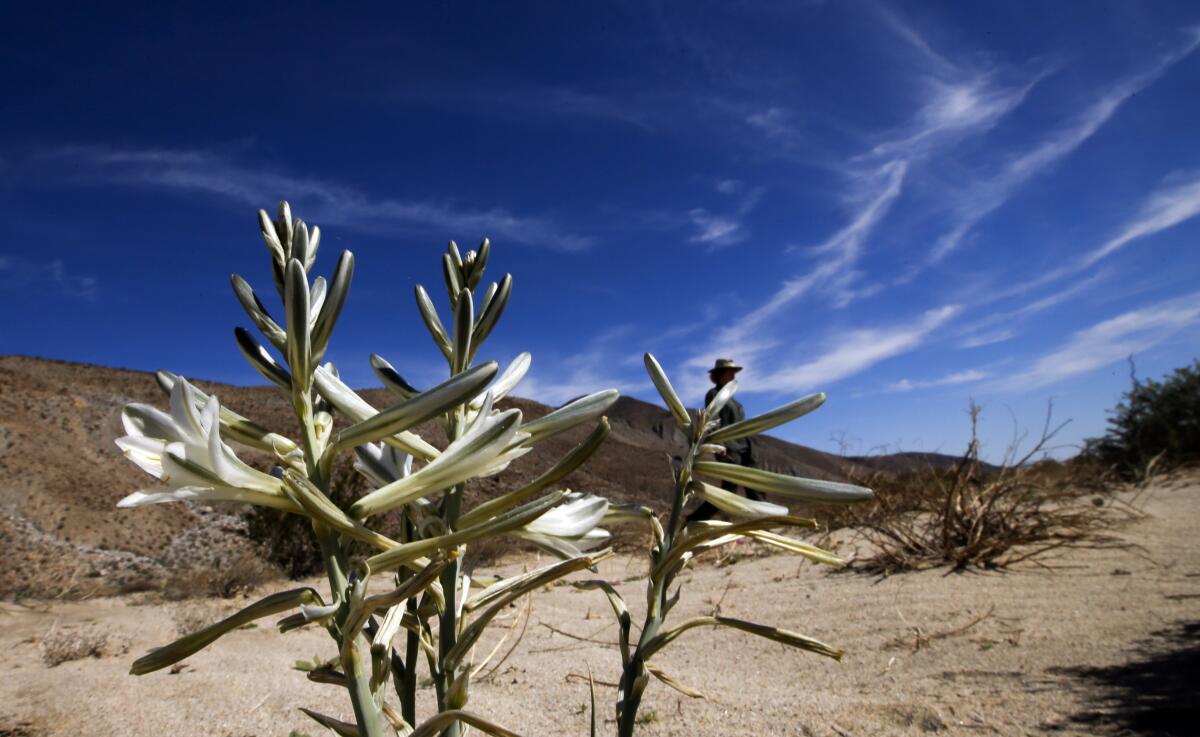
Like birders, wildflower enthusiasts exhibit an encyclopedic knowledge of the arcane and rabid enthusiasm for the rare. When the unusual becomes commonplace, it’s as if the ground trembles beneath them.
As guide Nancy Cohee drove us into Anza-Borrego Desert State Park, about 100 road miles south of Palm Springs, the tortured landscape yielded to swaths of yellow brittlebush, purple Arizona lupine and the pink of sand verbena. We parked at the Galleta Meadows Estate area, near Borrego Springs, and Cohee wandered around, dazed, not at what she was seeing, but at what she wasn’t.
“I’m absolutely amazed there are not flowers here,” she said. “All of this should be covered.”
Then she brightened, spotting a rare desert lily, its full white bloom clinging to the desert floor. In 25 years, she recalled spotting only two. No sooner had the words escaped that we spotted another. And another. We stopped counting at 50.
To understand the magnitude of that Valentine’s Day downpour last year, consider that the Palm Springs area averages a little less than 5 inches of rainfall in an entire winter. Dumping 80% of one winter’s rain in a day, Cohee said, resulted in flower seeds being pushed around like leaves scattered by a raging wind. Because each square yard of desert sand can contain 10,000 seeds or more, prospective flowers by the millions upon millions were scattered and primed to bloom.
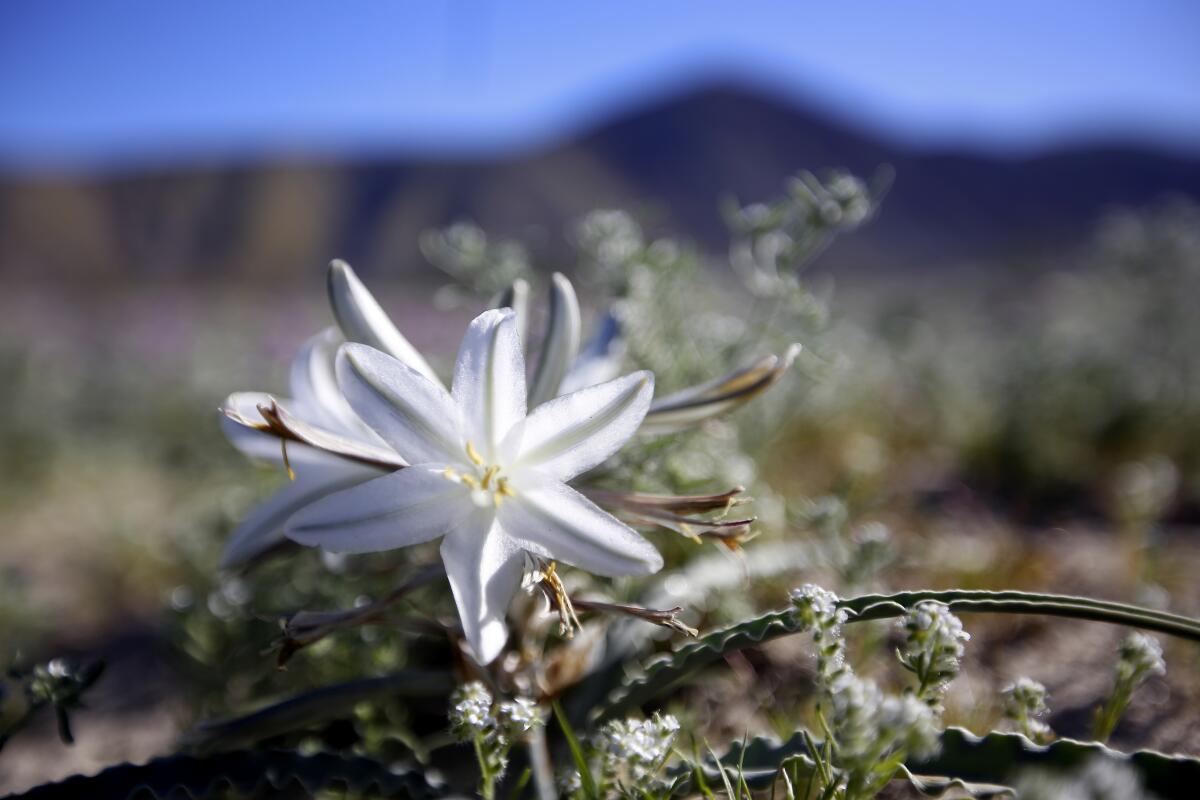
Even in a year that’s not a superbloom, a lot gets overlooked. The naked eye isn’t enough. Cohee carries a jeweler’s loupe to magnify tiny buds, rendered glorious by close inspection:
Spectacle pods: White ruffly petals, with green fruit climbing the stem in pairs, like spectacles.
Brown-eyed primrose: Eight stamens grasping like tentacles from the brown center of four white, fan-shaped petals.
Spanish needle: A tiny cluster of purple- and pink-tinged florets that Cohee likes to call “Barbie’s bouquet.”
Where to find L.A.’s most common spring wildflowers
On the drive back to Palm Springs, Cohee detoured slightly to show us a roadside sliver of the Coachella Valley Preserve. It’s home to the Thousand Palms Oasis Preserve, a popular hiking spot and one of our planned stops for self-exploration later in the trip; she told us to be on the lookout for ghost flowers and sand blazing stars.
We stopped briefly to freshen up at the adults-only Sands Hotel & Spa, a chic Moroccan reimagining of a ‘50s-era hotel, with a courtyard pool as centerpiece. Fortified by a Jalisco Sidecar and Turkish coffee by the fire pit, we let the afternoon fade before dinner on the rooftop restaurant/bar at 4 Saints in downtown Palm Springs.
It’s one of those special-occasion places to savor a hint of truffle in the house cavatelli, linger over a passion fruit crêpe and enjoy the lights — stars above, city below.
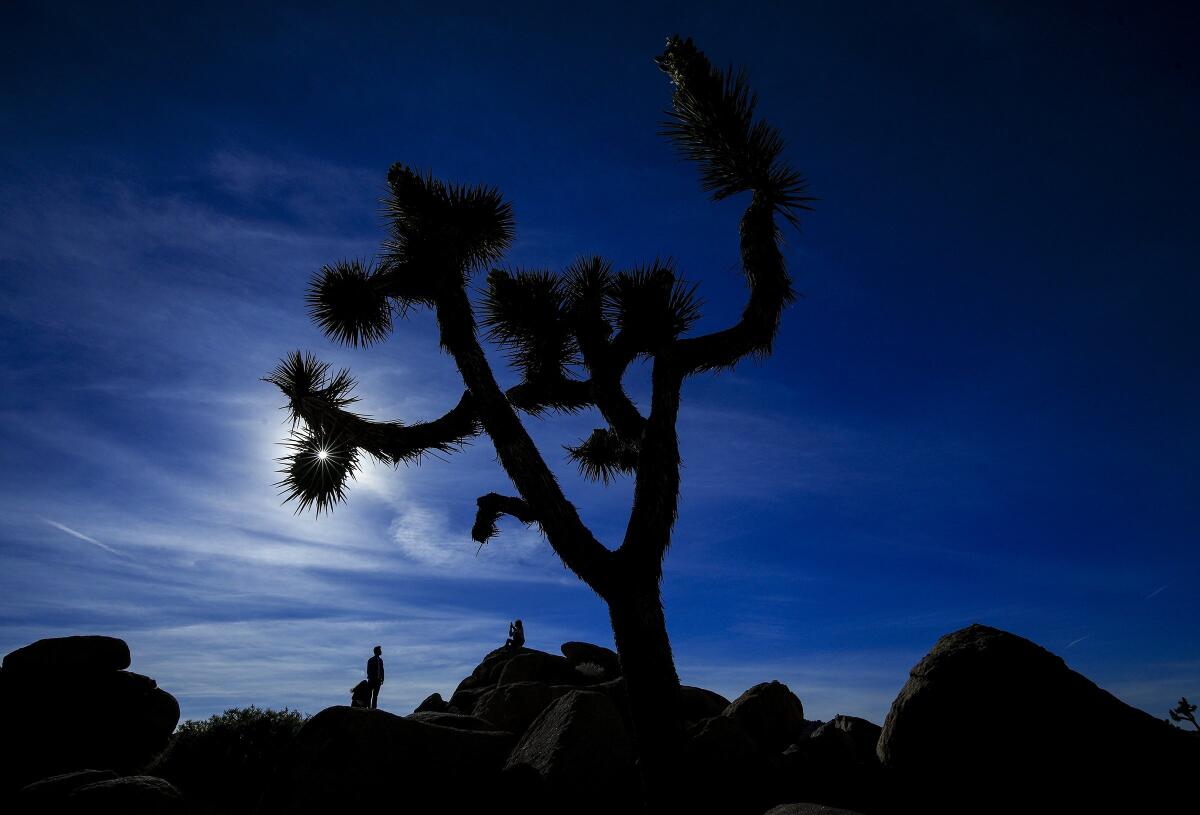
On two separate afternoons we ventured on our own to the south entrance of Joshua Tree National Park. It’s hard to describe the sheer sensory overload from acres upon acres of lupine, bluebells, chia, poppies and more, resting like a patchwork quilt on the rolling landscape.
The Bajada Nature Trail, a groomed and easily accessible walk of about three-tenths of a mile, has plenty of benches and signage about desert plants. A tiny hummingbird hovered near us before disappearing with a flash of green.
One morning we shared an open-air Jeep with guide Morgan Levine of Desert Adventures Red Jeep Tours. On the drive out to the private Metate Ranch, set along the buckling San Andreas fault, she described the area’s geology and history.
As we wandered on foot, Levine occasionally brought hidden plant details into focus with a magnifying glass.
“A lot of these they call ‘belly flowers,’” she said, describing the need to hug the ground to appreciate the fine details in rock daisies or the rich purple buds on an indigo bush.
On our last morning we lingered over breakfast at Wilma & Frieda, the kind of place where your only worry is whether to go sweet with banana-caramel French toast or savory with an omelet packed with pork chile verde and brie.
Later we were off to Thousand Palms Oasis Preserve, its parking lot jammed with other flower-seekers. We never found the ghost flowers or sand blazing stars there that Cohee had told us to watch for, but the Moon Country Loop by way of McCallum Trail made for a glorious hike nevertheless.
Griffith Park and the Santa Monica Mountains are close-to-home destinations. Farther afield, try Antelope Valley or the Carrizo Plain.
The nearly five-mile round-trip walk started with a shady respite among the palm trees, then gave way to hillsides blanketed in yellow: poppies, brittlebush, desert sunflowers. Amid the yellow canopy awaited a sprinkling of pink sand verbena and the delicate white buds of popcorn flowers, often known as white forget-me-nots.
Altogether unforgettable, flowers or no.
If you go
THE BEST WAY TO PALM SPRINGS
From downtown Los Angeles, it’s a two- or three-hour drive to Palm Springs, depending on traffic. You can fly, although you’ll find that some trips route through Phoenix. United has nonstop service that starts at $293, including taxes and fees.
WHERE TO STAY
Sands Hotel & Spa, 44-985 Province Way, Indian Wells; (760) 321-3771. Intimate and classy, this Martyn Lawrence Bullard-designed gem is open only to adults. Doubles from $199.
WHERE TO EAT
Del Rey at Villa Royale , 1620 S. Indian Trail, Palm Springs; (760) 327-2314, Most dinner entrees $10-$30.
4 Saints, 100 W. Tahquitz Canyon Way, Palm Springs; (760) 392-2020. Most dinner entrees $17-$45.
Pink Cabana, 44-985 Province Way, Indian Wells; (760) 321-3771. Most dinner entrees $24-$34.
Wilma & Frieda, 73575 El Paseo Drive, Suite 2310, Palm Desert; (760) 773-2807. Most breakfast and lunch entrees $12-$16.
HOW AND WHERE TO SEE THE AREA
South entrance, Joshua Tree National Park, (760) 367-5500. Just outside the park’s southern boundary, along Cottonwood Springs Road, are seemingly endless options. Free outside the park. Park admission: $15 per person on foot or bike, $30 per car.
Thousand Palms Oasis Preserve, 29200 Thousand Palms Canyon Road, Thousand Palms; (760) 343-2733. Expect parking to be tough, but the payoffs after a shady walk through the oasis are flowers if there’s a spring bloom and a walk along the Moon Country Loop. Free; donations accepted.
Tallgrass Hiking & Tours, (760) 219-3000. Guide Nancy Cohee conducts private tours, including transportation, to Anza-Borrego Desert State Park and many other sites. Costs vary, starting at $150 per person.
Desert Adventures Red Jeep Tours, (888) 440-5337. This longtime tour operator takes visitors to the private Metate Ranch, which has a palm oasis, and offers a firsthand look at the San Andreas fault. Cost is $140 per person for adults; $125 for seniors 62 and older; and $115 for children 12 and younger.
TO LEARN MORE
Visit Greater Palm Springs
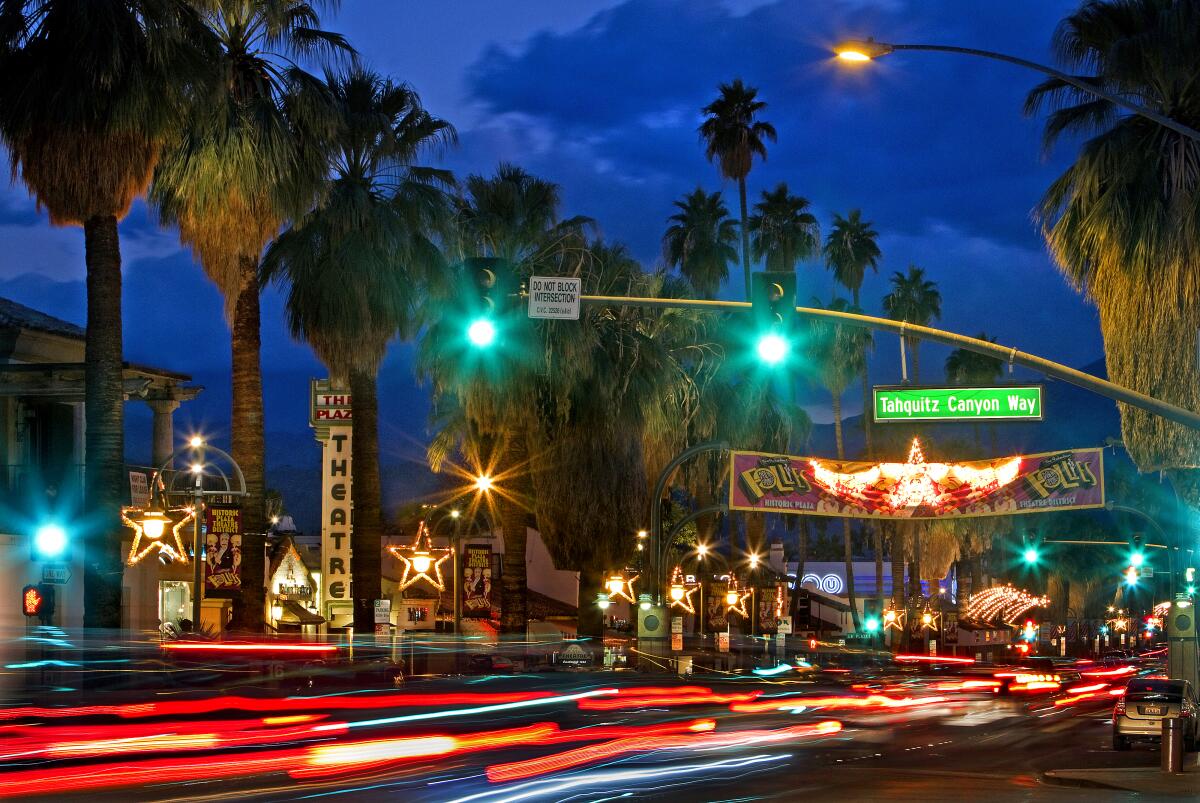
The Palm Springs area is packed with things to do and see besides wildflowers. Here are some of our favorites:
• Enjoy a leisurely drive through Joshua Tree National Park. Whether you visit for a few hours or a few days, the namesake giant yucca plants and jumbled rock formations offer an otherworldly view, like faithful sentinels guarding decaying castles.
• Soak in the blissfully hot mineral waters in and around Desert Hot Springs. We enjoyed a light lunch at Two Bunch Palms, then filled a giant wooden tub with water as hot as we could stand, emerging relaxed and nap-ready an hour later.
• Take a trip back to the 1950s with the Modern Tour, which couples author/guide Michael Stern’s encyclopedic knowledge of Palm Springs architecture and history with visits to some incredible examples of the spare Midcentury Modern architectural style.
• Stroll the wide walkways of downtown Palm Springs, stopping for a sweet treat at Brandini Toffee (132 S. Palm Canyon Drive) or Great Shakes (160 S. Palm Canyon Drive). Then sit at one of the many patio bars during happy hour and people-watch.
• For two weeks every year (March 9-22), one of the world’s biggest tennis tournaments comes to Indian Wells. The BNP Paribas Open’s first two days of qualifying offer free admission, an unbeatable bargain.
Sign up for The Wild
We’ll help you find the best places to hike, bike and run, as well as the perfect silent spots for meditation and yoga.
You may occasionally receive promotional content from the Los Angeles Times.